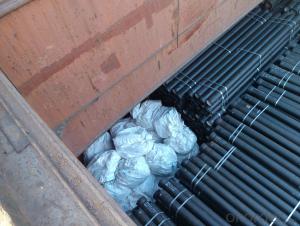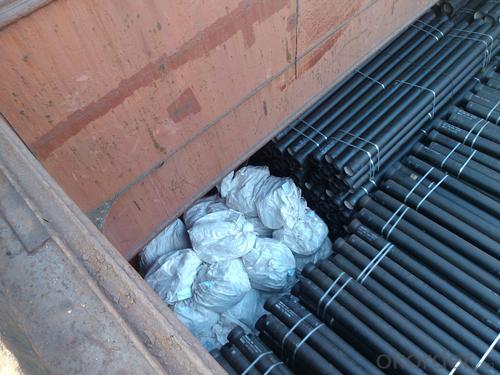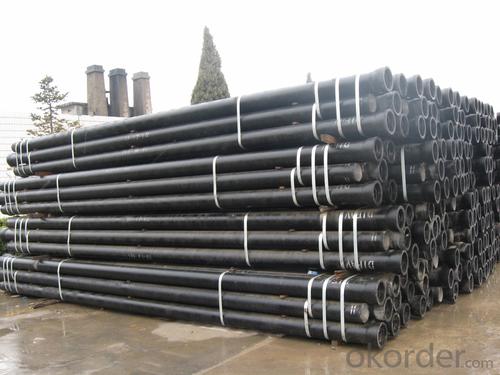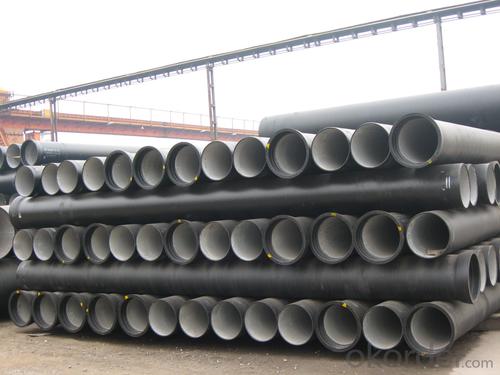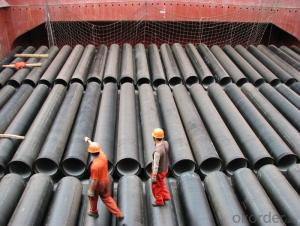DUCTILE IRON PIPE DN800 K9/C
- Loading Port:
- China Main Port
- Payment Terms:
- TT OR LC
- Min Order Qty:
- -
- Supply Capability:
- -
OKorder Service Pledge
OKorder Financial Service
You Might Also Like
Specification:
1) The standard of pipe: ISO2531:1998, K9
2) Effective length: 6m
3) Inner cement line: Portland cement line as per ISO4179
4) Zinc coating: at least 130g/m2 as per ISO8179
5) Bitumen painting: at least 70um as per ISO8179
6) With 100% quantity of NBR ring, or SBR ring, or EPDM ring as per ISO4633
7) DN80mm-800mm
8) High strength, lighter than grey iron, good corrosion resistance, no furring, small flow resistance, easy fixing, long life tome about 100 yeas
9) Produced by Hangzhou chunfeng machine
10) Checked by automatic inspection equipment
11) Composition:
Chemical composition | | | | |||
Chemical composition | Ductile Cast Iron Pipe (%) | Grey iron pipe (%) | Steel pipe (%) | | | |
C | 3.5-4.0 | 3.2-3.8 | 0.1-0.2 | | | |
Si | 1.9-2.6 | 1.4-2.2 | 0.15-0.4 | | | |
Mn | 0.15-0.45 | 0.4-0.6 | 0.3-0.6 | | | |
P | ≤0.06 | ≤0.3 | 0.02-0.03 | | | |
S | ≤0.02 | ≤0.1 | 0.02-0.03 | | | |
Mg | 0.03-0.06 |
|
| | | |
12) Feature:
Mechanical properties | | | | |||
| Ductile Cast Iron Pipe | Grey Iron Pipe | Steel Pipe | | | |
Tensile Strength(Mpa) | ≥420 | 150-260 | ≥400 | | | |
Yield Strength(Mpa) | ≥300 | No Confirmation | No Confirmation | | | |
Bending Strength(Mpa) | ≥590 | 200-360 | ≥400 | | | |
Elongation (%) | ≥10 | Neglected | ≥18 | | | |
Brinell Hardness(HBS) | ≤230 | ≤230 | About 140 | | | |
13) T type mechanical joint
14) Packing: in bulk or container
- Q: Can ductile iron pipes be used for trenchless pipe rehabilitation methods?
- Trenchless pipe rehabilitation methods offer a way to repair or rehabilitate existing pipelines without the need for extensive excavation or trenching. In these methods, ductile iron pipes are often used due to their durability, strength, and resistance to corrosion. Various trenchless methods, such as pipe lining, pipe bursting, and slip lining, can be used to rehabilitate ductile iron pipes. These methods involve inserting a new lining or pipe inside the existing ductile iron pipe, which helps to extend its lifespan and improve its structural integrity. Ductile iron pipes are the preferred choice for trenchless rehabilitation because they can withstand the forces and pressures involved in the process, providing a reliable and long-lasting solution.
- Q: Can ductile iron pipe be used for compressed air systems?
- Yes, ductile iron pipe can be used for compressed air systems. Ductile iron pipe is known for its strength, durability, and resistance to cracking, making it suitable for various applications including compressed air systems. It is capable of withstanding high pressure and is less likely to corrode or rust compared to other materials. However, it is important to ensure that the ductile iron pipe is properly sized and installed to handle the specific requirements of the compressed air system. Additionally, regular maintenance and inspection should be conducted to prevent any potential issues or damages.
- Q: What is the expected thrust restraint method for ductile iron pipes?
- Typically, to achieve the expected thrust restraint for ductile iron pipes, mechanical joint restraints are employed. These restraints are designed to counteract the axial forces or thrust caused by the fluid pressure within the pipe. Thrust blocks, tie rods, and harness restraints are the most commonly used types of mechanical joint restraints for ductile iron pipes. Thrust blocks are concrete structures strategically placed around the pipe joints to resist the thrust forces. They are typically constructed at bends, tees, and other directional changes to prevent pipe movement. Tie rods, on the other hand, are another frequently used method of thrust restraint. These involve steel rods that are anchored to the pipe and securely fastened to an immovable structure to counter the thrust forces. Harness restraints, however, are constituted by a series of steel rods or cables that encircle the pipe and are anchored to the ground on both sides. These restraints effectively distribute the axial forces along the pipe's length, preventing movement and ensuring stability. The choice of a specific thrust restraint method for ductile iron pipes may vary depending on various factors such as pipe diameter, fluid pressure, soil conditions, and local regulations. It is vital to consult industry standards, engineering guidelines, and local authorities to determine the appropriate thrust restraint method for a particular application.
- Q: Are ductile iron pipes more expensive than other pipe materials?
- Yes, ductile iron pipes are generally more expensive than other pipe materials such as PVC or HDPE. However, they offer superior strength, durability, and longevity, making them a cost-effective choice in the long run for applications that require high pressure or corrosive resistance. Additionally, ductile iron pipes have a lower life cycle cost due to their reduced maintenance and repair needs.
- Q: Can ductile iron pipes be used in gravity sewer systems?
- Yes, ductile iron pipes can be used in gravity sewer systems. Ductile iron is a strong and durable material that is commonly used in various applications, including sewer systems. It has excellent resistance to corrosion and can withstand high pressure and heavy loads. Additionally, ductile iron pipes have a smooth interior surface, which helps to reduce friction and improve the flow of waste and wastewater. Therefore, they are a suitable choice for gravity sewer systems, where the flow of sewage relies on gravity to move through the pipes.
- Q: What is the external coating used in ductile iron pipes?
- The external coating commonly used in ductile iron pipes is a protective layer made of either cement mortar or polyethylene.
- Q: What is the expected deflection capability of ductile iron pipes?
- The expected deflection capability of ductile iron pipes is typically around 2-5% of the pipe diameter, allowing them to withstand moderate levels of ground movement or settlement without experiencing significant structural damage.
- Q: Are ductile iron pipes suitable for potable water applications?
- Ductile iron pipes are indeed suitable for potable water applications. Their reliability and durability have been demonstrated through their longstanding use in water distribution systems. These pipes exhibit a commendable resistance to corrosion, a crucial factor in upholding the quality of drinking water. Moreover, ductile iron pipes possess a high tensile strength, reducing the likelihood of breakage or leakage. Furthermore, their smooth interior surface aids in maintaining optimal water flow and preventing the accumulation of deposits or contaminants. In conclusion, ductile iron pipes are an appropriate selection for potable water applications due to their impressive strength, durability, and corrosion resistance.
- Q: What material is ductile cast iron 235A?
- Ductile iron is a pig iron
- Q: Do ductile iron pipes require special maintenance?
- Yes, ductile iron pipes do require special maintenance. While ductile iron is known for its strength and durability, it is still susceptible to certain forms of corrosion. Regular maintenance is necessary to prevent corrosion and prolong the lifespan of the pipes. This maintenance typically includes periodic inspections to check for any signs of corrosion or damage, as well as cleaning and protective coating applications. Additionally, proper handling and installation techniques should be followed to ensure the integrity of the pipes. Regular maintenance and adherence to industry best practices can help prevent leaks, breaks, and other issues, ultimately saving time and money in the long run.
Send your message to us
DUCTILE IRON PIPE DN800 K9/C
- Loading Port:
- China Main Port
- Payment Terms:
- TT OR LC
- Min Order Qty:
- -
- Supply Capability:
- -
OKorder Service Pledge
OKorder Financial Service
Similar products
Hot products
Hot Searches
Related keywords
